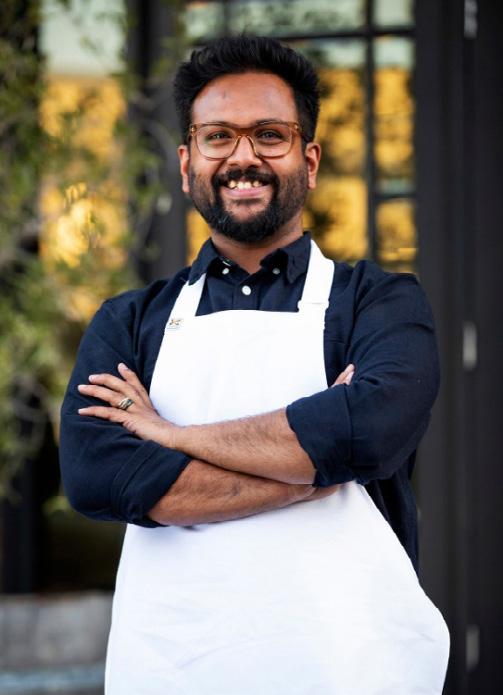
15 minute read
A recipe for happiness
from 2018-07 Sydney (1)
by Indian Link
BY NEHA MALUDE
“Inever had the sense of selfworth or confidence to apply to MasterChef,” starts Loki (Lokesh) Madireddi, “I simply never thought myself good enough to get in, you know?”
One wouldn’t believe that this Indian- origin MasterChef contestant, a people’s favourite, would have ever said this. For Loki stormed into the popular cooking competition, guns ablaze with his Indiainspired dishes that left the judges hankering for more, and won the season’s very first immunity pin in what was a surreal episode of fine cooking.
The confidence came after a long bout of self-doubt though. “I was in the real estate industry and I was just very disillusioned with the job. It was becoming difficult to just get out of the bed and face the day.
My 6-year-old son Indy (Indryaan) who’s wise beyond his years asked me ‘If you’re so unhappy, why don’t you just apply to MasterChef? You watch it every year, you love cooking, so why don’t you do it?’”
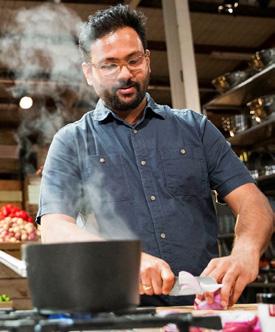
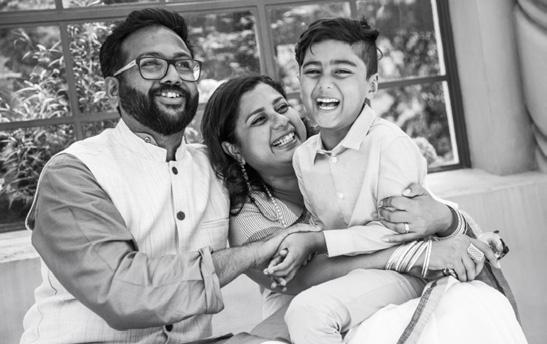
What followed was fate – Loki quit his job, applied to the show and was called in for the audition four days later – and the ex-contestant says he has his son to thank for the incredible experience.
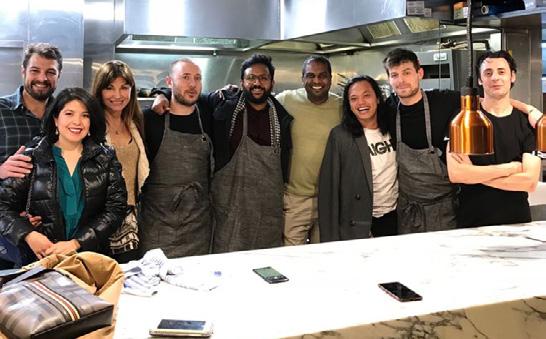
Loki’s tryst with food is nothing new. “I was born in Mysore, brought up in Chennai and my family (ancestors) is from Andhra Pradesh. I consider myself more Tamilian than anything else because that’s where I grew up and spent my formative years. I studied at Don Bosco, was a backbencher and stole people’s lunchboxes,” he laughs.
Following a near-fatal accident, Loki was sort of placed under house arrest.
“You know how Indian parents are. They became really protective and I wasn’t even allowed to go out and play after that. So I started hanging out with my grandmother who used to cook in the backyard. My father was in the railways and back then seafood used to be transported for export via railways. Thanks to that, our home always had surplus of fresh produce like crabs, fish, prawns. I’d sit with my grandmother and watch her cook.”
He adds, “My first cook was a fried egg – I was five years old. I got yelled at for using the stove unsupervised and I had locked myself inside the kitchen because I wanted to surprise my parents. My mum screamed that I could’ve burnt the house down but I just did what I had seen her do – I’m a visual person, I see someone cook something and I can copy them step for step.”
Possibly the reason why Loki never ‘measured stuff’ in the MasterChef kitchen. “Yeah, I’m not a ‘measurer’. I cook instinctively. I mean I get that there are dishes (especially desserts) where you have to keep an eye on those scales for every little gram, but that’s why perhaps those aren’t my strengths,” which was also the reason behind his untimely elimination – in spite of being in the possession of an immunity pin, something he made MasterChef history for.
“Ben (Borsht) took me aside and said to me ‘It’s okay, go ahead and use your immunity pin. We’re all fine if you do.’ It was a lovely gesture but it just didn’t sit right with me,” shrugs
Loki, who decided to forego using his pin to “stand by his mates”.
While many criticised him for his move, it didn’t bother him. “The one person that matters to me the most said that he was proud of what I’d done, so I’m at peace with my decision. If I had to, I’d do it all over again.”
As one might think, though, winning that immunity pin isn’t the highlight of Loki’s MasterChef journey. “For me, there’s only one moment that stands out like nothing else does: the moment I walked out of the audition with the apron hidden behind my back. Indy walked towards me thinking I didn’t get it and when I whipped it out, his face just lit up. I will never forget that.”
Undoubtedly his biggest fan and influence, Indy is just as enamoured with food as his father. The two have started ‘Indy-Loki Adventures’, a series of fatherson cooking sessions where they go fishing and explore different cooking techniques.
The 34-year-old stay-at-home dad also plans to start a cooking school for kids someday. “I don’t really want to teach kids. I want to introduce them to how food is grown and how it makes its way to our plates. They should go out into the rice paddies and see how it’s harvested. I want to do workshops where they can really connect with food. I also want to introduce people to India’s ancient cooking traditions, like how we cook on coals and not on a gas stove. It’s where the flavour comes from, it’s the soul of food.”
Frontline Medical Centre
NORTH PARRAMATTA
PHONE 9890 9778
58 Ross Street, North Parramatta, NSW 2151

Sumathy Mahen
MBBS, FRACGP, Dip. Paediatrics, FAP General Practitioner Tamil Speaking Lady Doctor. Speciality in Paediatrics and Child Health
SERVICES PROVIDED
• General practice for all ages
• Immunisation
• Child Health
• Workers Compensation

• Paediatrics
• Women’s Health,
• Pap Smears
• Minor Surgery
• Pathology, Blood Test
• ECG
BULK BILLING APPOINTMENTS & WALK-INS

OPENING HOURS
Mon, Tue, Thu & Fri 9:00 am - 5:00 pm Wednesdays 9:00 am - 1:00 pm 1st Saturday of every month 9:00 am - 1:00 pm
Weekends / Public Holidays Closed
How Odisha is encouraging inter-caste marriages
In a move to encourage more inter-caste marriages among the Hindu community in the state, the Odisha government has increased the incentive from the present Rs 1 lakh to Rs 2.5 lakh.
SC and ST Development Minister Ramesh Chandra Majhi said the move will be implemented from 14 September and the incentive will be provided in a marriage between upper caste Hindus and SC Hindus, irrespective of the economic status of the marrying couple.
In August last year, the state government had hiked the incentives to Rs 1 lakh from Rs 50,000 to encourage more such intercaste marriages. As per the norms, the couple shall have to apply for sanction and will have to execute a bond. They have to refund the amount within a year if the marriage ends in divorce within five years, said an official.
New app to report election model code violations
The Election Commission has launched a mobile app for citizens to report any violation of the Model Code of Conduct (MCC) during elections.
The app, called cVIGIL will be used in the upcoming assembly elections in Chhattisgarh, Madhya Pradesh, Mizoram and Rajasthan on a pilot basis before being used during the next Lok Sabha elections.
“The app requires an Android smartphone equipped with a camera, good internet connection and GPS access. The operating system should be Android Jellybean and above. The application supports all the latest Android smartphones,” the poll panel said in a press note.
To report a violation, one would need to click a picture or record a video of up to two minutes’ duration of the scene of violations of the model code. The photo or video is to be uploaded on the app. Using GIS, the app will map the location. Once submitted, the user gets a unique ID to track and receive the follow up on their mobile. The identity of the complainant will be kept confidential.
To prevent any misuse, the app will not allow uploading of the pre-recorded or old images and videos.
“By using this app, citizens can immediately report on incidents of misconduct within minutes of having witnessed them and without having to rush to the office of the returning officer to lodge a complaint,” the EC said.
Once the complaint is lodged, the information beeps in the District Control Room from where it is assigned to a field unit, consisting of flying squads, static surveillance teams and reserve teams.
Go vegan: PETA tells college students
To promote veganism, PETA-India has initiated a campaign to reach out to college students and highlight the cruelty inflicted on male chicks and calves.
The campaign ‘Save the boy child: Try Vegan’ aims to encourage students, especially freshers, to go vegan and condemn the killings in egg and dairy industry of male animals. Vegans consume only plant-derived foods.
The male animals are deemed worthless because of their inability to produce eggs or milk, the People for the Ethical Treatment of Animals (PETA) said.
“Because male babies cannot be used for profit by the cruel egg and dairy industries as their subjugated female counterparts, they are typically chucked out like trash or killed,” said PETA India CEO Manilal Valliyate, “PETA India will call on young people to condemn this cruelty and go vegan.”
According to the findings of PETA, male claves and other unwanted chicks are commonly killed by being ground up, drowned, burned, crushed, suffocated or even fed to fish while still alive by the egg and meat industry workers.
“We have video proofs where these live chicks are fed to the fish in fisheries... the male calves are either abandoned in the streets, left to starve, or sent for slaughter,” Valliyate said, adding that the campaign will feature such videos in the colleges.
On 27 July, watch the longest lunar eclipse of 21st century
The longest total lunar eclipse of the 21st century will occur on 27 July, and will be visible in all parts of India.
The eclipse will last for an hour and 43 minutes, giving viewers a wonderful opportunity to experience the event, according to Debiprosad Duari, Director, Research & Academic, M.P. Birla Planetarium, Kolkata. It will be preceded and followed by partial eclipses lasting more than one hour.
The partial eclipse of the moon will start around 11.54pm Indian Standard Time, with the total eclipse beginning at 1.00am on 28 July.
“No special filters are required to protect your eyes like those used for solar eclipses. One does not need a telescope to watch the eclipse, although a good pair of binoculars will enhance the experience,” Duari said. An eclipse of the moon takes place only on a full moon day. Whenever the sun, earth and moon come in a perfect straight line, as the sun’s rays fall on earth, its shadow falls on to a patch of space, and only when the moon enters that patch of shadow can one see a lunar eclipse.
184 special trains will run during Jagannath Rath Yatra
This year, during the nine-day Lord Jagannath’s Rath Yatra in Odisha from 14 July, 184 special trains to and from Puri will be pressed into service.
The trains will ply from Khurda, Bhubaneswar, Bhadrak, Cuttack, Paradip, Berhampur, Bhawanipatna, Keonjhar, Bangiriposi, Palasa and Visakhapatnam in Andhra Pradesh, Kharagpur, Shalimar in Kolkata between 14 and 25 July, an official of East Coast Railway (ECoR) said.
Fourteen special trains will run towards Puri. One special train each will start from Visakhapatnam, Kharagpur, Shalimar and Junagarh Road for Puri on 13 July. One train each will start from Bangiriposi, Kendujhargarh, Bhadrak, Cuttack, Paradeep, Brahmapur, Palasa and three from Khurda Road for Puri on 14 July.
In the reverse direction, 14 special trains will leave from Puri for Visakhapatnam, Kharagpur, Shalimar, Junagarh Road, Bangiriposi, Kendujhargarh, Bhadrak, Cuttack, Paradeep, Brahmapur, Palasa and three towards Khurda Road on the Rath Yatra day.
The Dalai Lama inaugurates Happiness Curriculum in Delhi
Tibetan spiritual leader the Dalai Lama was in the capital recently to inaugurate the Happiness Curriculum of the Delhi government along with Chief Minister Arvind Kejriwal and Deputy Chief Minister Manish Sisodia.
The curriculum, launched for over 1,000 government schools, focusses on meditation and mental exercise and aims to make students “good human beings” and professionals who will not indulge in corruption.
“What we need in the world today is an education of values, not based on any religion, but based on common sense and scientific knowledge,” said the Dalai Lama, adding, “This is needed to deal with the destructive emotions in the world. So what is being started in Delhi schools can have an impact on the whole world.”
Kejriwal called it a “landmark day” which will “completely transform the modern education system”. “This should have been done 100-150 years ago. We have forgotten the meaning of education. Our education system only generates clerks and has failed in making kids better humans,” he said.
Designer to donate proceeds from new line to wildlife conservation
Designer Krsnaa Mehta, whose brand India Circus works closely with Wildlife SOS, an organisation for conserving and protecting India’s wildlife, is creating a new line inspired by it. Not only that, the proceeds from the sale of the products will be donated to Wildlife SOS.
“I was inspired to do this after I met (Wildlife SOS CEO) Kartick Satyanarayanan and visited the elephant sanctuary in Agra. I am so moved by this plight of animals in India that we at India Circus are creating a line dedicated to the animals in India,” Mehta said. “Our products will start going on sale in our stores and online soon and certain proceeds from this will go to the Wildlife SOS funds.”
Delhi gallery exhibits last works of painter SH Raza
The last artworks created by noted painter Sayed Haider Raza are now part of an exhibition at Triveni Kala Sangam’s Shridharani Art Gallery in New Delhi.
The exhibition titled Uttar Raag is on till 10 July, displays close to two-thirds of the late celebrated Indian modernist’s last works including his last finished painting Swasti (2016) and his last unfinished canvas.
The paintings have been inherited through his will by Raza Foundation, an arts and culture organisation he himself established.
“Towards the end of his life he was living to paint, and painting to live. The distance between life and art was almost closed for him,” said poet Ashok Vajpeyi, trustee of Raza’s foundation. He added, “He must have had some feeling that these were his last years. He was weak, his energy was on the decline and he was slowly losing his eyesight, but he would invariably reach his studio from the bedroom every day and sit before the canvas on easel.”
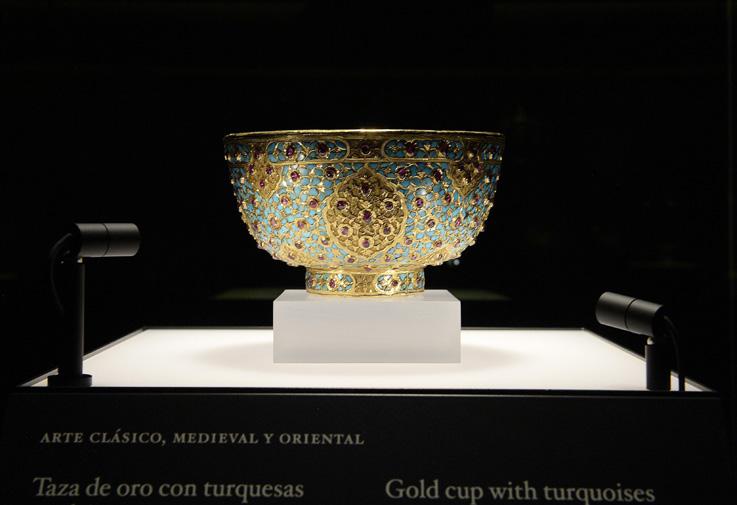
The art maestro was born in 1922 in Mandla in what is now Madhya Pradesh, and moved to France a few years later where he lived for almost six decades. Raza now lies buried next to his father in Mandla. He was awarded the Padma Shri in 1981, the Padma Bhushan in 2007 and the Padma Vibhushan in 2013.
Indian American judge vying for spot in US Supreme Court
Indian American federal appeals court judge Amul Thapar has emerged as a “serious” contender for a spot in the US Supreme court and has been interviewed for the position by President Donald Trump.
Trump’s spokesperson Sarah Sanders confirmed that he met for 45 minutes with four candidates, but would not identify them.
Considered a conservative, Thapar, 49, had served as a federal prosecutor before President George W. Bush appointed him a judge of the federal court for Eastern Kentucky by in 2007.
He is the second Indian-American judge to be a leading contender for the Supreme Court, Washington Appeals Court Judge Sri Srinivasan was among the top choices considered by then President Barack Obama for the Supreme Court in 2016.
IIT Kharagpur to honour 13 illustrious alumni
IIT Kharagpur will honour thirteen alumni with the Distinguished Alumnus Award during its 64th Convocation on 20 July. The awardees include academicians and eminent scientists in India and abroad, a defence professional and a social contributor.
Some of the names from the list are Ashim Kumar Datta of Cornell University, an expert in the physics of food, Chaitali Chakrabarti of Arizona State University, an expert in VLSI, and Narayan B.T. Mandayam of Rutgers University, an expert in wireless information network, and V. Narayanan, Director, LPSC at ISRO, an expert in cryogenic rocket propulsion technology.
The award list also includes exemplary achievers such as Lt Gen Utpal Bhattacharyya (retd), a 1971 and Kargil war hero and management expert, and Swami Smaranananda, monk, yoga guru and General Secretary of Yogoda Satsanga Society of India Paramahansa Yogananda Path, Ranchi.
American father-daughter bring technology to rural India
National Geographic explorer Mike Libecki and his 14-year-old daughter Lilliana have collaborated with Dell as a part of its Give Back Project to work in a remote village of Tawang in Arunachal Pradesh.
At Jhamtse Gatsal’s Children’s
Community, which is home to about 90 children, the duo has installed 20 new laptops, new printers, internet access and are imparting computer education to kids and teachers in Tawang. They have also installed new solar power panels and solar generators for the computer centre and other buildings in the community.
“Without computers and internet, they will lag behind and not be able to go to school and college. In the times that we live in, we need to be technologically advanced and savvy to make progress. But we also needed to ensure that they are able to use the computers…that they are trained properly and, whenever the situation arises, they should have help from technicians,” said Mike.
“We take these technological boons for granted every day. We never think what our lives would be had we been unfortunate too. We just have these at our disposal. So why should other human beings not have them too?” he added.
Tea-seller turns teacher for aspiring doctors in Odisha
He could not become a doctor himself, but is now pulling out all the stops to ensure that others fare better. This year, 18 students from Odisha made it to medical school thanks to the initiative of Ajay Bahadur Singh, who once sold tea for a living but now imparts free medical education to 20 under-privileged students. His inspiration? Anand Kumar’s famed Super 30 in Patna, which mentors students from underprivileged sections of the society for admission to the prestigious Indian Institutes of Technology (IITs).
Recalling the eight-year journey of his Jindagi (Life) campaign, Singh said: “I started the initiative in 2010. Initially, only 2-3 students came to me for coaching and they started qualifying for medical college in 2012. This year, 18 students have been selected in the medical entrance examination.”
Not only does Jindagi provide coaching, it also takes care of boarding and lodging for 20 students free of cost. Singh said he started the initiative because he couldn’t become a doctor himself. “My father was an engineer and he aspired to make me a doctor. But as luck would have it, he had a kidney problem and we had to sell our properties for a kidney transplant. I had to sell tea for my family’s sustenance. So I could not become a doctor,” said Singh, who belongs to Deoghar in Jharkhand but settled in Bhubaneswar in 2005.
The Jindagi initiative is now being viewed as a novel initiative not only in Bhubaneswar but in the entire state. “The experience has been wonderful so far. Anand Kumar’s Super 30 initiative has been an inspiration for many across the world and I also tried to make a beginning. It really is an amazing experience to help poor students from underprivileged sections of the society climb the ladder and join the mainstream workforce. The joy is bigger than what wealth can give. My team and I are fully devoted to this cause and the successes have only motivated us to work harder,” Singh added.
A couple of years ago, Twinkle Sahu, one of Singh’s students, sold flowers outside Jagannath temple to help her father, Madan Mohan Sahu, who sold eggs. Twinkle, however, really wanted to be a doctor. When Singh saw her one day with flowers in one hand and a book in the other, he approached her. “I faced innumerable difficulties in life. We are very poor. But my desire and the help from Jindagi has helped me qualify in the medical entrance test,” Twinkle said.
Santosh Nahak has a similar story. His father Nitai Nahak is a farm labourer. The family could barely make ends meet, leave alone spare money for Santosh’s studies. “About the time I passed Plus Two (Class 12), my father became paralysed, and he was the only breadwinner in the family. At that time, I thought I would want to become a doctor who could treat paralysis. But my studies were affected. Luckily for me, Jindagi came to the rescue,” Santosh said. Although Singh is a graduate, he does not teach the students. Instead, he has recruited a staff of 15-20 teachers. The funds for Jindagi come from the +2 Adyanta Science College affiliated to the Odisha government.
They collect the fees from about 600 students studying in the college and use a part of that to run Jindagi.
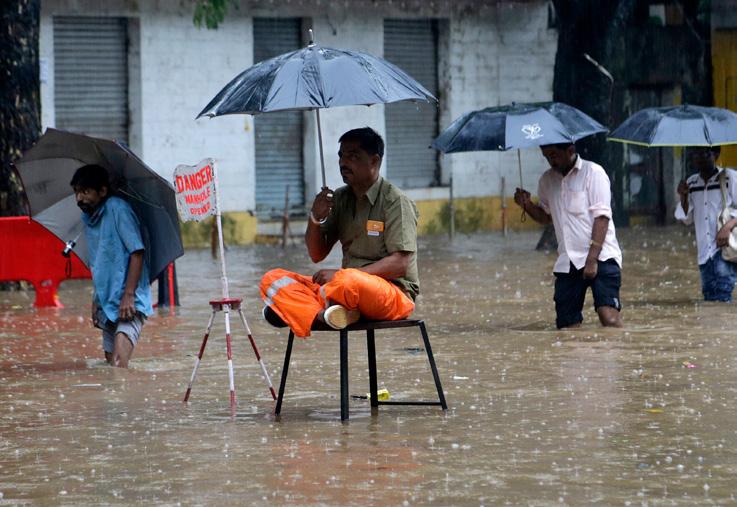
524-member Indian contingent announced for 2018 Asian Games
A 524-member Indian contingent will feature in the upcoming Asian Games, slated to be held from 18 August in Jakarta and Palembang, Indonesia, the Indian Olympic Association (IOA) announced recently.
The contingent will comprise of 277 men and 247 women athletes from a total of 36 sports disciplines.
Of the various sporting disciplines, athletics will have the highest number of representation with a total of 52 members participating. This time, eight new disciplines have been added to the contingent where the country has shown promise, namely: Karate, Kurash, Pencak Silat, Roller Skating, Sambo, Sepaktakraw, Triathlon and Soft Tennis.
Women drivers to debut at National Racing Championship
For the first time in the history of JK Tyre FMSCI National Racing Championship, women professional racers will feature in the competition, starting 7 July in Coimbatore.
More than 60 women racers from across the nation got together at the Karti Motor Speedway in Coimbatore recently to bag the 12 coveted seats on offer of which the best 24 got to participate in the selection trials.
The top five, plus a celebrity driver, Marathi actress Manisha Kelkar, were eventually picked, who will now compete in the 21st edition of the JKNRC for Team Ahura Racing, starting this weekend. The other six drivers have been kept as reserves.
In the trials, Coimbatore’s Roshni proved to be the fastest driver followed by Meghalaya’s Lea Daran, Bengaluru’s Priyamvada, Coimbatore’s Megaa, Bengaluru’s C Hansuja and Manisha Kelkar.









